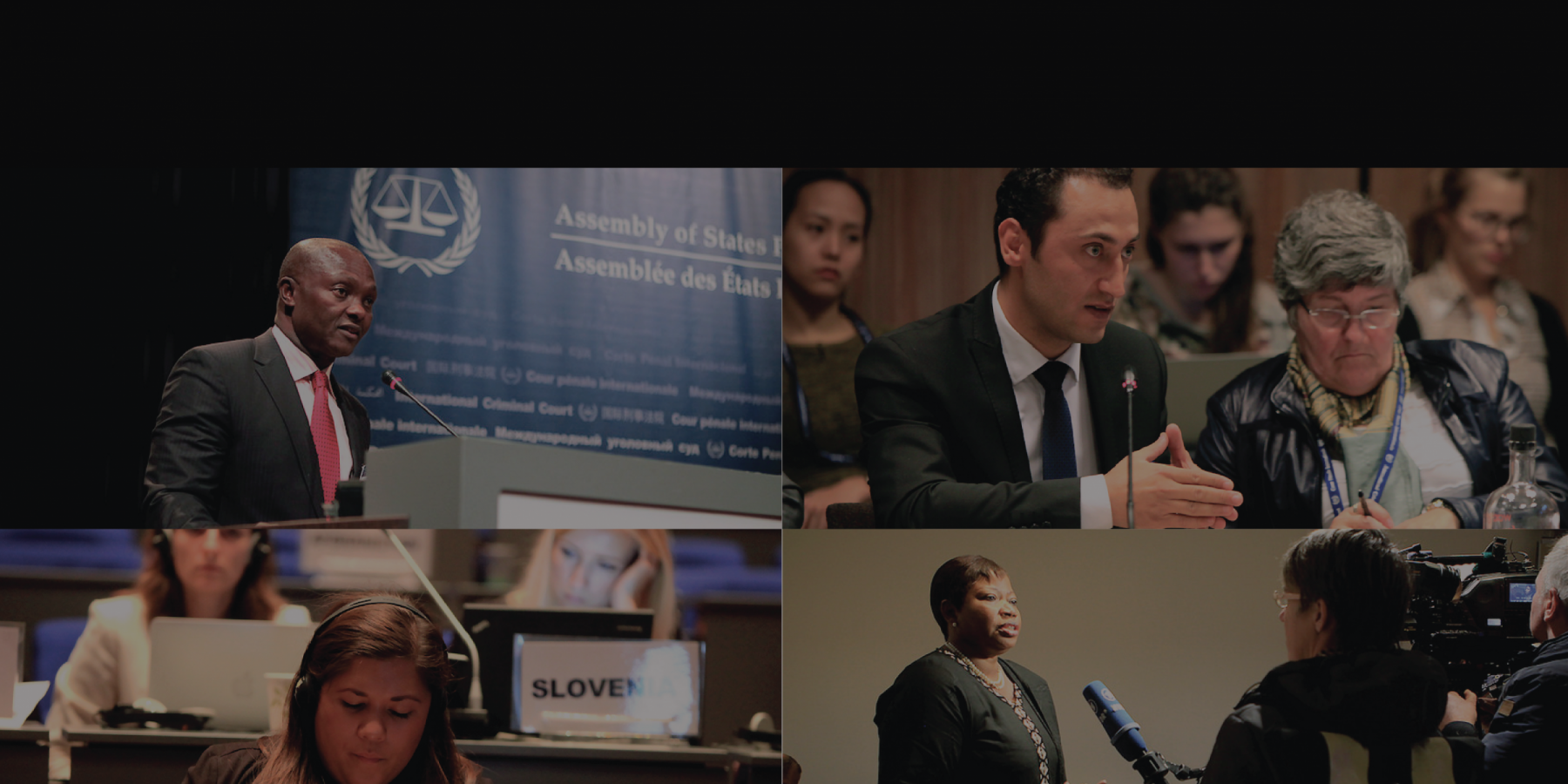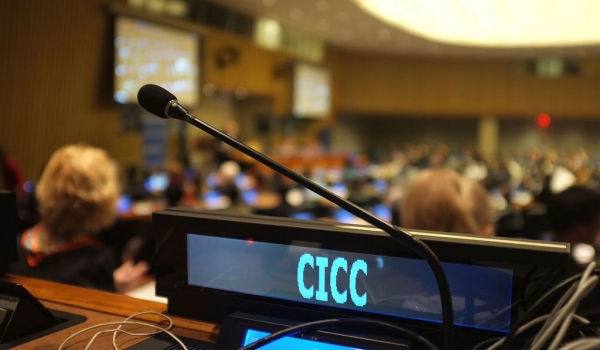Assembling for international justice
As the Rome Statute system of international justice nears 20, the International Criminal Court's governing body begins its annual session on 4 December in New York.
But what is the Assembly of States Parties (ASP) and what’s up for discussion this year?
What is the Assembly of States Parties?
ICC member states—collectively the ASP—will gather in New York in early December to discuss and decide on ways to make the Court and international justice more effective. But how does the ASP do this when it is the Court that independently conducts proceedings?
The ASP is responsible for ICC laws and rules—their drafting and amendment, for example—as well as management oversight. The ASP also encourages ICC member states to increase their cooperation with the ICC and undertake national prosecutions of grave crimes in the first instance (complementarity).
A year in the making
The 16th annual session of the ASP (ASP 16), which consists of 123 member states, will take place from 4 to 14 December at the UN in New York.
Throughout the year leading up to the annual session, ICC member states attend informal consultations, known as ‘working groups,’ in The Hague and New York to discuss pending issues. The consultations are divided into facilitations, each with a mandate to discuss a specific topic relevant to the Assembly’s functions, such as bolstering cooperation, approving the annual budget of the Court, and, this year, activating the Court’s exercise of jurisdiction over the crime of aggression.
The outcomes of each annual ASP session differ according to the specific issues under discussion in any given year but typically fall under recurring general topics. At the conclusion of this year’s ASP session we can expect the plenary to have adopted language in stand-alone resolutions—or as part of the catch-all omnibus resolution—on cooperation, complementarity and universality, all of which are discussed within dedicated facilitations during the preceding year.
Civil society participation at the ASP
ASP decisions not only affect member states’ political will and cooperation, whether mandated or voluntary, but also the functioning of the Court itself. The ASP session is thus a pivotal forum for the Coalition for the International Criminal Court, which has promoted both state and NGO advocacy at ASP sessions for well over a decade.
Since the first ASP session the Coalition has facilitated NGO access to these negotiations with an aim to increase global NGO participation and input in the ICC process. During the 2003 ASP, member states recognized, in a resolution, the “coordinating and facilitating role of the Coalition for the ICC” in this regard.
Global civil society, facilitated by us, the Coalition, will continue to observe and monitor the meetings between ICC member states at this year’s ASP session. Civil society organizations will also be among those co-organizing the great number of side events that will take place in the margins of the ASP session—it is these side events that greatly expand and enrich the scope of discussions that would otherwise take place.
Civil society will in this way use ASP 16,and the unprecented access it affords NGOs to the Court’s governing body, as an opportunity to urge member states to strengthen various aspects of the ICC system.
Key elections on the radar
After the opening session the first major action at this year’s ASP session will be elections among the member states to fill six vacant seats on the ICC's judicial bench; six seats on the Committee on Budget and Finance (CBF); a new ASP President and two Vice-Presidents; and members of the ASP Bureau. NGOs monitor these elections to ensure they are fair, transparent and lead to the election of the most qualified candidates. The Coalition does not itself endorse or oppose individual candidates, but rather advocates for the integrity of the nominations and elections procedures. The Coalition strongly opposes reciprocal political agreements (“vote-trading”) in ICC and ASP elections.
The General Debate: A chance for high-level political commitment
The General Debate will take place during the first two days of the ASP session. It provides an opportunity for participants to address issues relating to the Assembly’s work and the wider Rome Statute system of international justice, often setting the tone for more focused discussions that will ensue during the ASP session.
The Coalition has long encouraged states to take full advantage of this chance to kick-start constructive discussions during the ASP session, and high-level expressions of political support for an end to impunity through the Rome Statute system is one powerful way to do this.
Special session on the 20th anniversary of the Rome Statute
To kick off year-long celebrations around the 20th anniversary of the adoption of the Rome Statute, the ICC's founding treaty, a special session will be held at ASP 16 for the international community to take stock of achievements so far, and to address how to enhance efforts to tackle challenges before the Court going forward.
Deciding on the Crime of Aggression
Following the 2010 Rome Statute amendments defining the Crime of Aggression and the modalities for the ICC's jurisdiction, a decision by the member states on the activation of the Court's exercise of jurisdiction over the crime is scheduled to take place at ASP 16.
Much at stake with ICC 2018 budget
In setting the annual ICC budget, member states have a chance not only to allow the Court to carry out its judicial and prosecutorial functions, but also to promote a positive narrative about the Court, bolster cooperation, complementarity, and universality efforts, and reinforce the initiatives around harmonization of courtroom procedures and geographic and gender representation among ICC staff.
During ASP 16, member states will adopt the ICC’s budget for 2018. ICC member states often rely upon the recommendation by the Committee on Budget and Finance (CBF) in setting the ICC’s budget and resources for the next year. This year, the CBF recommended member states approve a budget increase of 2.4% compared to the 2017 budget, lower than the 4.4% increase the Court had requested.
Share this page
Complementarity: National jurisdictions take center stage
Before the ICC gets involved, national authorities are urged to investigate and prosecute first: the ICC is after all a court-of-last-resort. In this way, the ICC is said to hold “complementary” jurisdiction over Rome Statute crimes. During ASP 16, member states will adopt language on complementarity as part of their omnibus resolution—in order to drive home the primary role that national jurisdictions have to play in the Rome Statute system. Following discussions in 2017, this language could also touch upon the Court’s own role in developing these national jurisdictions, beyond the formal implementation of ICC laws and rulings.
Cooperation: A multi-faceted concern
The ICC relies on state cooperation to ensure that its decisions are enforced, suspects arrested, victims and witnesses protected, and fair trial standards upheld. To bolster cooperation already envisioned by the Rome Statute in the absence of an ICC police force, the ICC and ASP undertake various initiatives to help make this happen. Among them, and on the slate for discussion at the 16th session, are voluntary agreements between the ICC and member states in areas of witness relocation, enforcement of sentences, and the hosting of released persons. Also being considered by member states this year is cooperation around the tracing, freezing, and recovery of financial assets of an accused, which can impact legal aid and reparations awards at the Court.
Member states at ASP 16 will adopt a stand-alone resolution addressing these as well as a number of related cooperation issues.
Amendments
The ICC's legal texts, such as the Rome Statute and the Rules of Procedures and Evidence (RPE), may be subject to amendments by the ICC member states. Amendments are a vital tool for keeping the Rome Statute, and legal codes and rules more generally, relevant in changing times and contexts. But any amendments should enhance--and not undermine--the effectiveness of justice delivered within the Rome Statute system.
This year, amendments were considered in two separate member state working groups in New York. Not only the crime of aggression, but also war crimes and RPE amendments may be considered or decided on by member states during the 16th ASP session.
Towards efficient and effective Court proceedings
Drawn-out courtroom proceedings have long dogged international criminal tribunals, and the ICC is no exception. More can be done to deliver justice in a reasonable timeframe, resulting in fairer trials for victims and defendants, and a more efficient use of the ICC’s limited human and financial resources. Throughout the year these issues are addressed in the Study Group on Governance and by the Court's Working Group on Lessons Learnt. At its 16th session, the ASP will adopt recommendations on how to continue to enhance the Court's efficiency and effectiveness.
Reviewing ASP/ICC policy with the Omnibus Resolution
The ASP’s omnibus resolution, or the “Resolution on Strengthening the International Criminal Court and the Assembly of States Parties,” addresses a wide range of substantive, practical, and policy issues relevant to the Court, the ASP, and other stakeholders. In this way the resolution serves as a catch-all for topics such as victims’ issues, complementarity, and efficiency and effectiveness, which do not feature in stand-along resolutions like cooperation issues. The omnibus resolution will continue to be negotiated throughout ASP 16.
Side events: Broadening the scope of ASP discussions
A number of events will be organized in the margins of the ASP session. During breakfast meetings, lunch events and evening receptions, many topics—whether on the ASP’s agenda or related to the ICC’s work and impact more broadly—will be put on the table to enrich the plenary discussions and resolution consultations taking place at ASP 16. A large number of these events are (co-)organized by NGOs.


